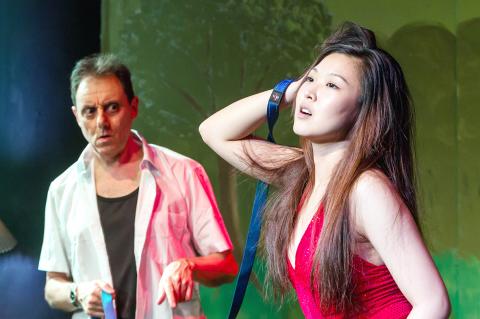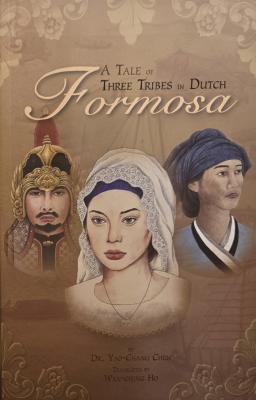Does that old adage “A dog is man’s best friend” hold true, if said dog threatens the man’s marriage of 22 years? Come judge for yourself as director Brook Hall and The LAB Space present their third play of the season, AR Gurney’s delightful, entertaining and thought-provoking comedy Sylvia.
The play opens as Greg (Maurice Harrington) returns home with a stray, street-smart dog Sylvia (Tiffany Tsai, 蔡天芸) that he found (or she found him?) in the park. Greg is facing a mid-life crisis. He is at odds with his boss; his career is going nowhere and his marriage to Kate (Sarah Brooks) seems mired in the humdrum period that often follows empty-nest syndrome. He definitely needs someone to talk to and show him affection.
Kate, on the other hand, is ready to enjoy her empty-nest freedom. Now she can finally focus on her career as an English teacher. A dog in the house? No, thank you. Her dog-raising days ended when the kids left home. But Greg pleads, and she agrees to “try it for a few days” and the play is off and running.

Photo Courtesy of Fabian Hamacher
With wit and humor, Gurney quickly takes the audience on a romp full of hijinks, fantasy and enlightenment as we examine the imagined anthropomorphic relationships and feelings with which we humans credit and endow our pets.
STELLAR CAST
Hall has chosen his cast well. Both Harrington and Brooks rise to the challenging task of playing a caring couple caught in a potentially boring situation without boring the audience. Greg, like a frustrated Walter Mitty alternately rhapsodizes on the “call of the wild” and not letting anything come between a “man and his dog” while at the same time also admitting he is “sick.”
Kate, as the kind wife who has never really hated anyone (except maybe Nixon) now finds she must, of all things, square off against a dog, one she appropriately calls Saliva. With a teacher’s background, she portrays life as a heroic drama and ends several scenes with quotes from Shakespeare.
Strong backup comes from the versatile fourth member of the ensemble, John Brownlie, who takes on multiple roles. First he is Tom, the philosophical owner of Bowser (dogs should never have female names) who advises Greg to have Sylvia spayed. Next he is Phyllis, Kate’s recovering alcoholic friend who quickly goes from water to scotch when pursued by the skirt-sniffing Sylvia. And finally Brownlie plays transgender Leslie, the shrink who needs a shrink. After several double-entendre dialogues with Greg who keeps Leslie guessing as to whether he is talking about his wife or Sylvia, Leslie advises Kate to get a gun and “shoot Sylvia right between the eyes.”
DOG WITH HUMAN QUALITIES
But what about Sylvia? Gurney takes Sylvia far beyond traditional dog roles like Old Yeller, Lassie and even Snoopy. Is she just a dog, or more? Is Greg the real one in need who credits her with too much feeling?
When Gurney finished this play in 1995, shocked feminist critics said no woman would ever play the role of a dog. How wrong they were, or how times have changed. This is a plumb role; one that allows an actress a wide range of emotions and Tsai plays it with full abandon. Seductive, playful, hyperactive, effervescent, eager to investigate and eager to please — all those things we love and sometimes are bothered by in a dog.
With costume changes that accent these many sides, Tsai acts oblivious to everything outside a dog’s moods — even the audience. She relishes her emotions, whether she is ragging on cats, being in heat or loving Greg even after she is spayed. Sarah Jessica Parker, who played the original starring role of Sylvia, went on to Sex and the City. And Tsai? Whatever is ahead, she will definitely be a part of Taiwan theater.
The LAB Space is the only full-time English-language theater in Taiwan, and this show receives a definite thumbs-up. It is quality theater, one that continues the excellent tradition established in their previous shows, Santaland Diaries and Tuesdays with Morrie.
It’s best to get there early. With open seating and cast members sometimes rolling on the floor, the better seats are in the first few rows. There are Chinese subtitles, but language is PG-13, meaning you may want to leave the kids at home. In the spirit of animal care, The LAB Space wants audiences to be aware of The Sanctuary, an animal-rescue organization.
■ Remaining shows are tomorrow to Sunday, 8pm at The LAB Space (實演場), 3F, 9, Beitou Rd Sec 1, Taipei City (台北市北投路一段9號3樓). Tickets are NT$550, available through accupass.com/go/sylvia or at the door

May 11 to May 18 The original Taichung Railway Station was long thought to have been completely razed. Opening on May 15, 1905, the one-story wooden structure soon outgrew its purpose and was replaced in 1917 by a grandiose, Western-style station. During construction on the third-generation station in 2017, workers discovered the service pit for the original station’s locomotive depot. A year later, a small wooden building on site was determined by historians to be the first stationmaster’s office, built around 1908. With these findings, the Taichung Railway Station Cultural Park now boasts that it has

The latest Formosa poll released at the end of last month shows confidence in President William Lai (賴清德) plunged 8.1 percent, while satisfaction with the Lai administration fared worse with a drop of 8.5 percent. Those lacking confidence in Lai jumped by 6 percent and dissatisfaction in his administration spiked up 6.7 percent. Confidence in Lai is still strong at 48.6 percent, compared to 43 percent lacking confidence — but this is his worst result overall since he took office. For the first time, dissatisfaction with his administration surpassed satisfaction, 47.3 to 47.1 percent. Though statistically a tie, for most

Six weeks before I embarked on a research mission in Kyoto, I was sitting alone at a bar counter in Melbourne. Next to me, a woman was bragging loudly to a friend: She, too, was heading to Kyoto, I quickly discerned. Except her trip was in four months. And she’d just pulled an all-nighter booking restaurant reservations. As I snooped on the conversation, I broke out in a sweat, panicking because I’d yet to secure a single table. Then I remembered: Eating well in Japan is absolutely not something to lose sleep over. It’s true that the best-known institutions book up faster

The excellent historical novel by Chen Yao-Cheng (陳耀昌) is a gripping tale of Taiwan in the 17th century, called Formosa at the time, told from the perspective of characters representing the three major ethnic groups (the “tribes” mentioned in the title): the indigenous community, the Dutch and the Chinese. Another element that makes this book stand out is the female perspective, as two of the main protagonists are Maria, the daughter of the Dutch missionary Hambroeck, and Uma, an Aboriginal woman with a strong character. The main Chinese character is Chen Ze, a man in charge of a merchant ship